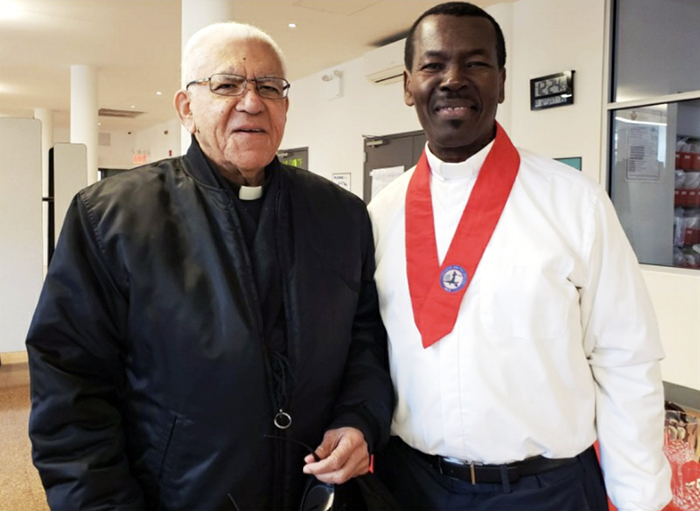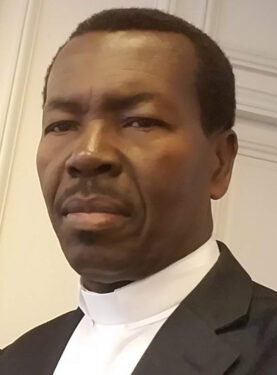
WINDSOR TERRACE — The death of retired Auxiliary Bishop Guy Sansaricq leaves both a legacy and unfinished work at an organization he helped create and directed for more than three decades — the National Center of the Haitian Apostolate (NCHA).
The Brooklyn-based center’s vice director, Msgr. Pierre-André Pierre, praised Bishop Sansaricq, who died Aug. 21, for leadership that fostered unity and spiritual growth among Haitian Catholics throughout the U.S.
“Bishop Sansaricq was so visionary,” the monsignor added. “It’s a lot of emotion for all of us now. But looking to the future, this ministry will continue.
“And this great legacy will be taken up to the next level, trying to unite Haitians in the community of Christ, and integrate them into the adventure of Christianity in the United States.”
Haitian-born priests in the U.S. created the NCHA during the 1970s. The founders included an assistant priest at Sacred Heart of Jesus Parish in Cambria Heights, Queens — Guy Sansaricq.
Before coming to the U.S., he had served Haitian refugees in the Bahamas for seven years, according to Msgr. Pierre.
Bishop Sansaricq became part of the Haitian diaspora when dictator President Jean Claude Duvalier refused to let him return home. Subsequently, Bishop Sansaricq went to Rome, where he studied for four years at the Pontifical Gregorian University.
His next stop was the U.S., including the Diocese of Brooklyn, where he saw fellow Haitians struggling, both economically and spiritually. This prompted him to help establish Haitian Americans United for Progress, Inc. (HAUP), based in Queens.
He then turned his attention to a collaboration creating the NCHA, Msgr. Pierre said.
Under the bishop’s leadership, the Haitian apostolate center was registered in New York State as a nonprofit corporation.
In 1988, the NCHA became affiliated with the Office of the Pastoral Care of Migrants and Refugees of the U.S. Conference of Catholic Bishops. The USCCB also voted to appoint Bishop Sansaricq to be that office’s first director, a job he held until his death.
Since its inception, the Brooklyn-based NCHA has helped Haitians settle in the U.S., find work, and grow in faith through biblical studies and other educational programs.
As the internet evolved, so did the apostolate, using digital platforms like YouTube and social media to reach Catholics in Haitian Creole, French, and English, Msgr. Pierre said.
The apostolate center reports that there are an estimated 1.5 million Haitians in the U.S., and most are recent immigrants. More than two-thirds of them are Catholic, “a fact that points Haitians as the largest group of black Catholic immigrants,” according to the center.

An estimated 150,000 of them belong to parishes in the Diocese of Brooklyn, said Father Hilaire Belizaire, coordinator of ministry to Haitian immigrants and pastor of Sacred Heart of Jesus Parish, Cambria Heights.
Msgr. Pierre is president emeritus of the University Notre-Dame of Haiti. Bishop Sansaricq invited him to Brooklyn a few years ago to help manage the NCHA. The monsignor declined to discuss how the next director will be selected.
“It is not mine to say what is to be done. I don’t want to express any opinion,” he said. “Let me say only this. We will serve. We are servants.”
As of Aug. 31, the USCCB had not yet made an official announcement about NCHA’s new director. However, Sister Joanna Okereke, program coordinator for the USCCB’s committee on Cultural Diversity in the Church, which oversees the apostolate, told The Tablet that Msgr. Pierre would be its next leader.
She said that was the intention of Bishop Sansaricq, “and, we will honor that intention.”
Meanwhile, there is much for NCHA to do, Msgr. Pierre said.
He noted that he and Bishop Sansaricq had planned to announce on Aug. 22 a new initiative with the working title, “Project Memory: Contributions of Haitians to the United States.”
Its goal is to showcase the accomplishments of Haitians in the U.S. in various sectors, including doctors, nurses, lawyers, business people, and clergy. The initiative’s format is not yet decided, but it could be a book, a website, or a TV documentary, Msgr. Pierre said.
Bishop Sansaricq “wanted to show how, within one generation, [the U.S.-based population] had grown up,” the monsignor said. “This is the story of the last 50 to 60 years of the Haitians in the country. It has not been a waste of time.”
Instead, he noted, new generations of Haitians have extended their record of successful careers and the achievement of equality.
“The American dream, you know, it is part of us, too,” the monsignor said.
